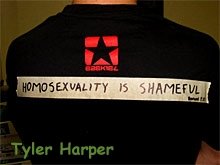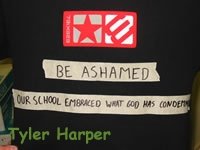 SAN FRANCISCO, CALIFORNIA - Schools in the western United States can forbid a high school student from wearing a T-shirt that denigrates gay and lesbian students, a sharply divided federals appeals court in San Francisco ruled today.
SAN FRANCISCO, CALIFORNIA - Schools in the western United States can forbid a high school student from wearing a T-shirt that denigrates gay and lesbian students, a sharply divided federals appeals court in San Francisco ruled today.In a 2-1 decision, the U.S. 9th Circuit Court of Appeals said that a T-shirt that proclaimed "Be Ashamed, Our School Embraced What God Has Condemned'' on the front and "Homosexuality Is Shameful'' on the back was "injurious to gay and lesbian students and interfered with their right to learn.'' The court said that the shirt can be barred on a public high school campus without violating the 1st Amendment.
"We conclude that'' Poway High School student Tyler Harper's wearing of his T-shirt " 'collides with the rights of other students' in the most fundamental way,'' wrote 9th Circuit Judge Stephen Reinhardt, quoting a passage from Tinker vs. Des Moines Independent Community School District, a seminal U.S. Supreme Court decision on the free speech rights of students.
"Public school students who may be injured by verbal assaults on the basis of a core identifying characteristic such as race, religion, or sexual orientation have a right to be free from such attacks while on school campuses. As Tinker clearly states, students have the right to 'be secure and to be let alone,' '' Reinhardt said.
"Being secure involves not only the freedom from physical assaults but from psychological attacks that cause young people to question their self-worth and their rightful place in society. The 'right to be let alone' has been recognized by the Supreme Court … as the most comprehensive of rights and the right most valued by civilized men,'' Reinhardt said.
Judge Alex Kozinski issued a strong dissent.
"While I find this a difficult and troubling case,'' the Poway Unified School District has "offered no lawful justification for banning Harper's T-shirt.''
There was no evidence that gay students were harmed by derogatory messages of the type conveyed on Harper's T-shirt, Kozinski said.
Moreover, Kozinski said there was no indication that a discussion Harper had with other students about the T-shirt "turned violent or disrupted school activities.''
In fact, Kozinski said, "while words were exchanged, the students managed the situation well and without intervention from the school authorities. No doubt, everyone learned an important civics lesson about dealing with others who hold sharply divergent views.''
Today's ruling comes amid a growing campaign across the country to compel public schools, state universities and private companies to annul policies protecting gays and lesbians from harassment. Plaintiffs in several lawsuits are seeking to knock out tolerance programs on the grounds that they violate religious beliefs that oppose homosexuality.

Legal experts, such as UCLA constitutional law professor Eugene Volokh, said the issue eventually would reach the U.S. Supreme Court.
The 9th Circuit decision stemmed from an incident in April 2004 when Harper, a Poway High School sophomore, wore the T-shirt to protest a Day of Silence at the school that was intended, in the words of a school official, to "teach tolerance of others, particularly those of a different sexual orientation.''
A teacher at the school told Harper that he believed the shirt was "inflammatory, violated the school's dress code" and "created a negative and hostile working environment for others.''
When Harper refused to remove the shirt that morning and asked to speak to a school administrator, the teacher gave him a dress code violation card. After meeting with Harper, school principal Scott Fisher said he could not wear the shirt on campus, but declined to suspend him as Harper requested. Rather, Fisher required Harper to stay in the school's front office the remainder of day. He was not subjected to any discipline beyond that.
About six weeks later, Harper, represented by the Alliance Defense Fund, a conservative legal organization that says it was founded to "aggressively defend religious liberties,'' sued the school district, contending that both his right to free speech and freedom of religion had been violated. Harper asserted that his wearing of the T-shirt was "motivated by sincerely held religious beliefs'' regarding homosexuality and that the school punished him for expressing them. He also contended that the school had attempted to change his religious views.
U.S. District Judge John Houston in San Diego ruled that Harper was not entitled to a preliminary injunction barring the district from enforcing its dress code. The 9th Circuit majority upheld Houston and rejected all of Harper's legal arguments.
At this stage, the 9th Circuit was reviewing Houston's ruling on the preliminary injunction. He is still considering the underlying merits of the case. However, today's ruling will shape the rest of the case in a profound way.
Both Reinhardt and Judge Sidney Thomas, who joined the majority opinion, are strong supporters of the 1st Amendment. Their opinion emphasized that it was limited to high schools and elementary schools, saying such speech would be permissible on a college campus.
The majority cautioned that "it is essential that students have the opportunity to engage in full and open political expression,'' and that "limitations on student speech must be narrow…. Accordingly, we limit our holding to instances of derogatory and injurious remarks directed at students' minority status such as race, religion and sexual orientation.''
Reinhardt cited a study showing that among teenage victims of anti-gay discrimination, 75% experienced a decline in academic performance, 39% had truancy problems and 28% dropped out of school.

"Indeed, gay teens suffer a school dropout rate over three times the national average,'' Reinhardt said, citing a study of the National Mental Health Assn.
"Those who administer our public educational institutions need not tolerate verbal assaults that may destroy the self-esteem of our most vulnerable teenagers and interfere with their educational development,'' Reinhardt wrote, noting that, by law, California schools are required "to minimize and eliminate a hostile environment on school grounds that impairs the access of pupils to equal educational opportunity.''
Harper is now a senior at Poway and will be heading off to college in the fall. Both his lawyer, Robert Tyler, and an attorney for the school district, Jack M. Sleeth, said Harper was an excellent student and had had no disciplinary incidents in the past two years.
Sleeth said school officials were pleased that "the 9th Circuit agrees that the staff of Poway High School handled this difficult matter correctly.''
He said the case clearly had broad ramifications.
"This is not just about Poway. It is about the rights of various people -- including gay students in schools everywhere and students with religious opinions,'' Sleeth said.
Tyler, general counsel of Advocates for Faith and Freedom, said he was disappointed in the ruling. He said he is not certain if he will seek a rehearing from a larger panel of 9th Circuit judges or seek review in the Supreme Court or wait until the trial concludes in Houston's courtroom.
Tyler said he agreed with Kozinski's dissent, particularly a passage commenting on the majority's statement that schools have the right "to teach civic responsibility and tolerance as part of its basic educational mission.'' That may be true, Kozinski said, but he chided the majority for concluding that it also was permissible to suppress other points of view. "One man's civic responsibility,'' he wrote, "is another man's thought control.''
The ruling came just a few days before Poway High School is scheduled to have its next Day of Silence.
from The Los Angeles Times
No comments:
Post a Comment